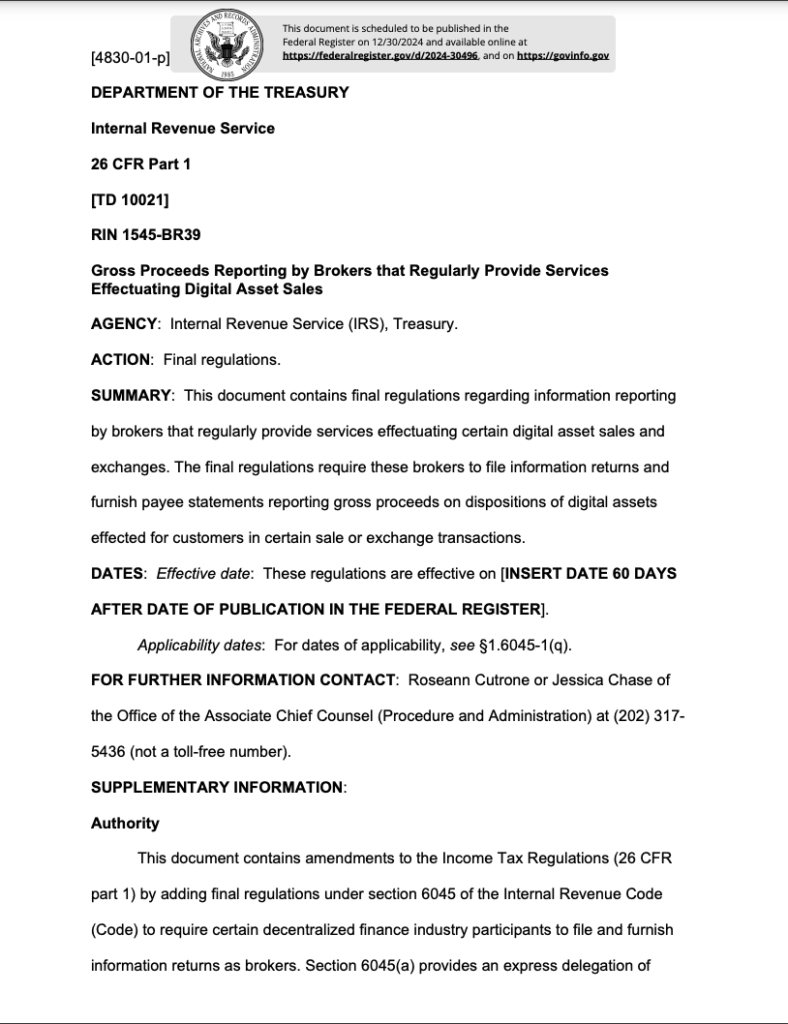The IRS DeFi Regulations is a threat
- DeFi platforms are now classified as brokers under new IRS rules, requiring KYC and transaction reporting.
- Compliance with these regulations is challenging due to decentralization and may alienate privacy-focused users.
- DeFi platforms face three options: comply, block U.S. users, or fully decentralize, each with its own risks.
The New DeFi Regulations from the IRS
On December 27, 2024, the IRS released a final rule that may change the course of decentralized finance (DeFi) forever. The rule classified DeFi front-end platforms as brokers, similar to those in decentralized exchanges (DEXs). This means that Uniswap, among other similar exchanges. Must now implement KYC protocols and then report millions of detailed pieces of transaction data to the IRS. It’s set to go live in 2027 but is already making waves through the industry.
DeFi platforms were originally designed to operate in a decentralized and privacy-centric manner. The new IRS regulations, however, challenge these core principles. With the requirement to track and report users’ activities, these platforms face a difficult decision. Which comply, block U.S. users, or decentralize even further. Each option presents its own set of challenges.

Option one
the IRS regulations compliance, would make DeFi collect user information and report their transactions, which is going to be a heavy burden, technically and administratively speaking.
Many DeFi applications are operated through decentralized autonomous organizations, which are non-upgradable smart contracts, so it may not be possible to make the changes easily. Another thing is that compliance could alienate users who really value anonymity and decentralization. For smaller platforms, these measures may be too costly to maintain operations in the U.S.
Option two
This will be to block the users whose country is in the U.S. Few of the DeFi websites have followed the same as they avoided their access just because the IRS does not regulate these sites, and this saves a few from regulatory interest, but these websites also lag behind some users to expand their platforms.
Option three
would be for DeFi platforms to fully embrace decentralization. Platforms that abandoned smart contract upgrades and revenue generation could turn to a more decentralized system. In this way, they would not be classified as brokers since they could not gather information about users or regulate transactions.
However, there are great trade-offs for this route: usability and innovation could be compromised, and monetization may be a problem.
The new IRS rules have elicited widespread resistance within the crypto community, with industry advocates claiming that the regulations will strangle innovation and send DeFi development out of the country. A joint lawsuit has already been filed against the IRS, stating that the rules are unconstitutional. With the deadline for compliance approaching, the DeFi industry is now at a crossroads, one that may change its future once and for all.
Highlighted Crypto News Today
Are Whales Driving Cardano’s (ADA) Price Surge?
Disclaimer: Investing carries risk. This is not financial advice. The above content should not be regarded as an offer, recommendation, or solicitation on acquiring or disposing of any financial products, any associated discussions, comments, or posts by author or other users should not be considered as such either. It is solely for general information purpose only, which does not consider your own investment objectives, financial situations or needs. TTM assumes no responsibility or warranty for the accuracy and completeness of the information, investors should do their own research and may seek professional advice before investing.
Most Discussed
- 1
- 2
- 3
- 4
- 5
- 6
- 7
- 8
- 9
- 10